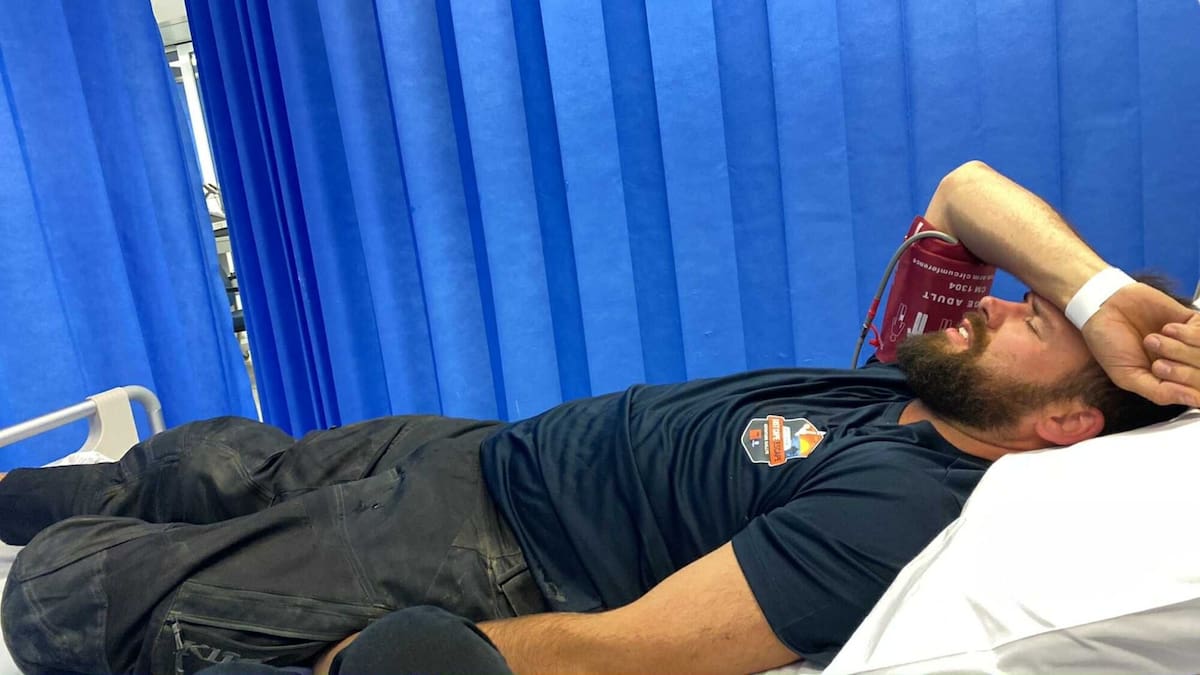The three-day mountain biking marathon starts today and is expected to inject millions into the local economy.
Jones will be among them, racing in the Canopy Tours 50km on Saturday.
Blake Jones is riding the Whaka 100 in Rotorua after breaking his back in a motorbike accident last year. Photo / Julia Sabugosa
“I hadn’t ridden a pushbike in 20 years, but after my accident, I was pretty grumpy and fed up, so I bought a cheap mountainbike and thought I’d give it a go because what else was there to do,” he said.
Jones still remembers that fateful moment he flew off his bike as he misjudged the cliff drop.
“As I was going over the cliff, I managed to separate myself from my bike. I was falling through the air thinking ‘this is going to hurt’.”
Jones flipped through the air and landed on his helmet, his body folding into his sternum with the impact. He was knocked unconscious, though he doesn’t remember this.
His friends found him at the bottom of the bank and picked him up, not knowing he’d broken his back.
Still pumped with adrenaline, Jones managed to get back on his bike – though he admitted to being in a “world of pain” – and rode 40 minutes back to his ute across rugged farm terrain.
By the time Jones reached his ute, he collapsed off his bike in pain but surprisingly, managed to crack open a beer with his friends before making the two-hour drive home.
“I didn’t realise how bad it was until I started driving. At that point, I was struggling to breathe, so I called my wife and told her I thought I’d broken some ribs, and I was going to the hospital,” Jones said.
Blake Jones and family.
Jones was whisked away in a wheelchair by hospital staff once he arrived. They found he’d suffered six compression fractures in his upper spine and bruised both lungs.
He was told the compression fractures were at about 30%. If the damage was over 50% he would have needed stabilisation surgery.
“It sort of made me realise, I was really f***ing lucky, you know. I could have quite easily been in a wheelchair or in a bed for the rest of my life.
“It was the best possible outcome for breaking a back, I guess. I was really fortunate not to have damaged the spinal cord.”
The first month post-accident was brutal, both physically and mentally.
After five nights in hospital, Jones spent four weeks in bed and had to wear a back brace for three months.
“I was just sore and fed up with not able to do much. I’d put on a bit of weight and wasn’t in a great place,” he said.
“My physio recommended cycling as part of my recovery, so I bought a crappy, cheap pushbike on Trade Me. As soon as I hopped on, it just felt right.”
Riders set off in last year’s Whaka 100 race.
Jones has now upgraded from the second-hand bike to a flash one and trains four times a week on his indoor bike, with a long ride on a Saturday and a recovery ride with his son on Sunday.
He’s lost about 15kg and has regained the strength in his back, all thanks to cycling. He was looking forward to giving it his all at the Whaka 100.
“You can always do a bit more than what you think you can when you get yourself into a bit of a suffer-fest.
“I was so lucky with my injury, and I know a lot of people don’t have the same outcome that I did, so I want to make the most of every opportunity to get out there and give it a crack.
“The Whaka 100 is a ‘bucket list’ event for mountain-bike riders all over the globe,” event spokesman Matt Thompson said.
“The event’s signature terrain combines endless single-track with relentless climbs and descents.
“It’s tough but rewarding. You won’t know whether to cry with happiness or pain. You’ll most likely do both.”
– Supplied content

